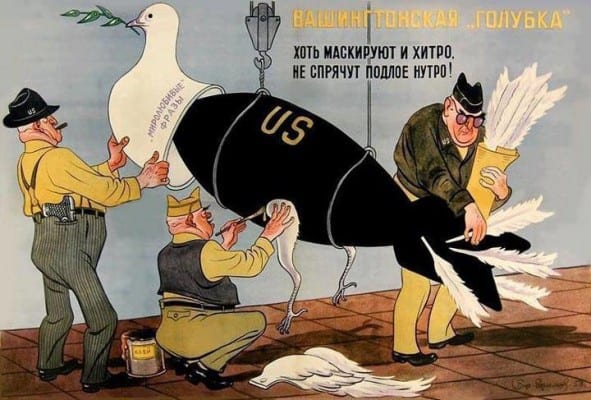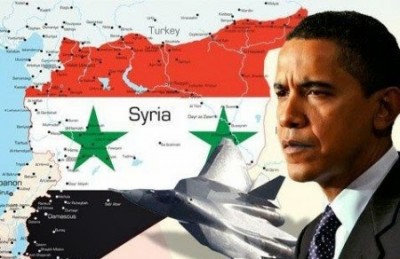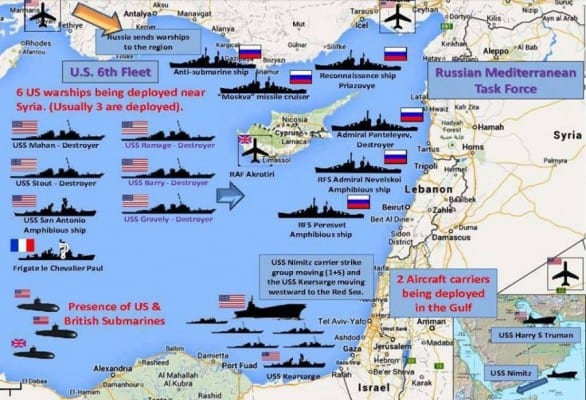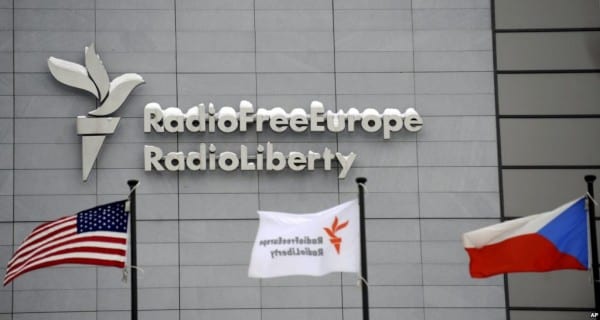The Myths of US Exceptionalism
Exceptional in Health, Education & Retirement?
by JACK RASMUS, Telesur
The appeal to exceptionalism is just another ideological ploy to get working classes to accept their deteriorating conditions.
One of the elements of cultural ideology in the USA is that the United States is somehow exceptional compared to other countries; that is, it is different in a number of positive ways that distinguish it from all other countries.
[dropcap]I[/dropcap]n a perverted way, there is some truth to this. The United States is exceptional in that it is the only advanced economy in the world that has failed to provide universal health care for its citizens. It has a large, parasitical for-profit health care system, dominated by multi-billion dollar profit making private health insurance companies that suck $1 trillion a year from the wallets of US consumers for pushing paper around, a vast network of ‘for profit’ hospital chains that suck another $900 billion a year, pharmaceutical drug companies that charge $94,000 for drugs to treat someone with hepatitis C (that’s $1,125 per pill) and charge patients $14,000 to $64,000 a month for cancer drugs, and it has the highest paid professional medical personnel in the world. The US spends more than $3 trillion a year, and rising, on health care. That’s about 18% of its $17.4 trillion annual GDP, or almost one dollar out of every five spent on everything is for healthcare. That’s the highest spending on healthcare in the industrial world. In return for that massive spending , it ranks 39th in infant mortality rates, 42nd in adult mortality, and 36th in life expectancy. Yes, the US is exceptional in health care.
It is also exceptional in education. Its college students have become, in effect, indentured servants to the education establishment of overpaid administrators and bankers, owing more than $1.1 trillion in debt just to get a college education—more per capita higher education debt than any other country in the world. The cost of attending a four year college today is, on average, $30,000 to $60,000 a year for a four year undergraduate education. For those who can’t afford college there’s no meaningful job training programs available any longer. Meanwhile, 70% of college professors and instructors in the US are part time/temp workers, many of whom earn poverty wages and have no benefits. That too is ‘exceptional’, I suppose.
US workers work the longest hours among the industrial economies, have the shorted annual paid vacations (on average 7 days paid a year), and face the prospect of poverty when they retire or can no longer work. Social security pensions average only $1,100 a month, private pensions (called 401k plans) average less than $50,000 total savings for those age 60 and approaching retirement, and more than half of US workers live pay check to pay check with no personal savings whatsoever. As 70 million ‘baby boomers’ born after 1945 start to retire, tens of millions of them face the prospect of a penniless, poverty-ridden retirement. No wonder the fastest growing segment of the US workforce is those aged 65-74, as many return to work just to make ends meet.
Income inequality in the US is also the most extreme among the advanced economies, and growing worse every year. CEOs of US corporations make around 400 times the average pay of the average worker in their company—the biggest gap in the industrial world. (In 1980 they made only 35 times).The wealthiest 1% households (investor class nearly all), gained no less than 95% of all the net income growth in the US since 2010, which compares to 65% during the George W. Bush years, 2001-2007, and to 45% during the Clinton years in the 1990s. Meanwhile, the median family income has been declining in the US at 1%-2% every year for the past decade. (Ok, maybe that’s not exceptional, since pay for workers has been steadily declining in Europe and Japan too).
US workers may get only 6 months unemployment benefits, at less than one-third their pay, when they lose their jobs, compared to German workers, for example, who get up to two years in jobless benefits and job retraining to boot. But, what the hell, we got more aircraft carriers than the Germans.
Yes, the US is exceptional. Its workers are the sickest, most indebted, most overworked, insecure, and among the least compensated and the most fearful of the future than any in the advanced industrial world.
The US is also exceptional in that it spends more on its military than all the rest of the advanced economies combined. The US’s true ‘war budget’ is about $1 trillion a year, not the reported $650 billion or so for the Pentagon, which is stuffed away in dozens of corners in its annual economic budget. It has more than 1000 military bases worldwide. It is engaged constantly in more wars worldwide than any other country by far. And it spies every day on more of its, and rest of the world’s, citizens than all the ‘spooks’ in the rest of the world do combined. ‘Exceptional’? You bet.
The Myth of US Economic Exceptionalism
Another favorite focus of late for the ‘US is exceptional’ crowd is the US economy.
Japan may be in its fourth recession since 2009. The Eurozone may be slipping in and out of recession every couple of years. But the US economy is in full recovery. So we’re told. It is growing nicely, while the rest of the world lags behind. Or so the ideological spin goes.
The ‘exceptionalists’ like to refer to last summer 2014’s US economic growth figures of 4% to 5% in GDP growth rates, its 200,000 a month new jobs created in 2014, and its ever-rising stock and bond markets as evidence of such economic exceptionalism. But a closer look, at last year’s much hyped 5% GDP growth in the 3rd quarter 2014, and at the data for most recent months in early 2015, show there is nothing exceptional about the US economy.
Long term, it continues to grow at an annual rate about half of what is normal in past decades.
Over the past six years, occasional quarter GDP growth rates of 4-5% typically are followed by a sharp collapse of GDP growth, or even negative GDP, within months. This in fact has happened four times since 2009 resulting in a ‘stop-go’ economic recovery: in the first quarter of 2011, fourth quarter of 2012, first quarter of 2014 last year—and it appears it may happen again a fifth time in the recent first quarter, January-March 2015.
The US economy’s ‘yo-yo’, or ‘seesaw’, economic trajectory is nothing special or exceptional. Japan and Europe have been experiencing the same. Their ‘bouncing’ along the bottom is just at a level closer to the bottom (or even below it) than has been the US economy’s the past five years. Whereas the US economy’s growth spikes up to 4% or so on occasion, only to collapse back again to zero or less growth, the US economic growth longer term has been averaging about 1.7% annually the past five years. That’s about half its normal growth rate compared to US recoveries from recessions in the past. Japan and Europe might spike to only 2% on occasion, but then slip to negative growth—i.e. into a bona fide recession.
So it’s ‘stop-go’ recovery for all three, occurring just at different levels of ‘go’ and of ‘stop’. Nothing exceptional or different economically over the longer term, in other words.
Comparing the US temporary 5% economic growth of last July-September 2014, to what will almost certainly prove to be a 1% or less growth rate for the January-March 2015 period when the final numbers come in later this May, shows that temporary, ‘one-off’ factors occurred last summer 2014 to produce the brief 4%-5% GDP US growth. Those temporary factors have since reversed or disappeared in the first three months of 2015. Take away those one-off factors of nine months ago, and one gets the less than 1% growth likely to register for the most recent three months, January-March 2015. Here’s a brief explanation:
Shale Gas/Oil Industrial Production Boom
In early 2014 the shale gas/oil boom was in full swing in the US. That boosted what is called Industrial Production and much of last year’s jobs growth. But when the global oil price glut began last June, precipitated by Saudi Arabia and its emirate friends attempt to drive the shale gas/oil producers in the US into bankruptcy, the shale boom in the US came to an abrupt halt. Industrial production slowed rapidly after the summer and has continued ever since, turning negative since December. Jobs began to disappear. It is projected that jobs in Texas, the largest shale producer, will decline by 150,000 in early 2015.
Manufacturing & Exports
In early 2015 US manufacturing and exports continued to grow, as the US dollar remained low giving US exports an advantage. But the collapse of world oil prices and the simultaneous talk by the US central bank it would raise interest rates resulted in a 20% rise in the dollar. Japan and Eurozone QEs pushed it still higher. The result was the beginning of a collapse in late 2014 of the contribution of US manufacturing and exports to US economic growth. That continues into 2015. Manufacturing orders have declined every month since December 2014.
Obamacare Consumer Health Spending
Another one-time boost to US GDP in mid-2014 was the signing up of 9 million of US consumers into the government’s new privatized health insurance coverage program, who couldn’t get health insurance. They started paying monthly premiums, and using health care services. That provided a boost to consumer spending that didn’t previously exist. But by 2015 the sign ups have leveled off. No more additional boost consequently in 2015.
Auto Buying Boom Goes Bust
Another consumer spending element that was peaking last summer was the boom in auto sales in the US. That too has now come to an end, as the market in the US has become saturated in terms of auto sales after four years. Auto sales since December, usually a strong month for auto sales, declined and have continued declining through February. The auto boomlet in the US is over.
General US Consumer Spending
Consumer spending in general has turned negative, starting in December. The US indicator, the Personal Consumption Expenditures Index (PCE) declined in December-January, was flat in February and suggests no change in March. Consumer spending was supposed to surge, according to mainstream economists, as consumers enjoyed lower gasoline prices. Instead, consumers saved the lower gasoline prices or used it to help pay off their massive debt loads (which this writer predicted would be the case last year). US retail sales, which constitute the largest part of consumer spending, grew at a 4%-5% rate over last summer. But once again has turned negative since December 2014, falling by -1.0%, -0.9%, -0.6%, December through February, and likely falling again in March 2015. So both retail sales and consumer spending in general have turned negative.
Business Spending
In the third quarter, July-September, of the year for the past five years, businesses in the US have boosted their spending, building up their inventories, in anticipation of a rise in year end holiday consumer spending. But the holiday spending then typically falls short of expectations, and businesses ‘work off’ the inventories in the first quarter, January-March, of the following year. This has happened yet again in 2015. Another element of business spending, on new equipment, is barely inching along, growing only 0.6% in the fourth quarter of 2014 and likely no more or even less in the first quarter.
Government Defense Spending
It is a well-known and documented fact that in the US, every other year in which there is a national election, the federal government holds off spending early in the year so it can release it in the summer before the election. That occurred in 2012 before the national presidential elections and in 2014 before the midterm Congressional elections. That government spending gives an added boost in the July-September quarter, as politicians try to create the impression the economy is doing better than it is longer term. That too happened last summer. But that spending will contract early in 2015 relative to last summer.
US Jobs Creation
Job creation always lags the real economy. And after growing jobs at a rate of 200,000 a month last year (mostly low paid, part time/temp, service jobs), jobs growth in March rose by only 126,000. Preceding months of January-February were also reduced. The employment data thus are now confirming the general economic slowdown in the first quarter 2015 as well. Apologists for the politicians will no doubt use the excuse of ‘bad weather’ for the feeble March jobs numbers. But what’s really happening is job creation is, and will continue, to slow due to real reasons. The ‘canary in the jobs mine’ is jobs in the goods producing sector, which have been slowing rapidly for several months and now turned negative in March. That reflects the collapse in manufacturing, mining, and good production that began late last year and now continues.
The Ideology of US Exceptionalism
[dropcap]I[/dropcap]n short, there is nothing exceptional about the US economy when one looks behind the ideological spin. It continues on its stop-go trajectory of the past five years. The economy weakens significantly every 4th quarter/1st quarter and the weak growth is ‘made up’ the following summer. Smoothing and averaging it all out over the year produces the longer term sub-historical average growth rate of around 1.8%–i.e. half of normal. And nothing exceptional. Japan and Europe are doing the same, just at a lower level of ‘stop-go’, sub-normal.
One of the favorite ideological strategies of ruling elites and classes is to convince their working classes that they are exceptional—i.e. meaning their situation may not be great, and may even be declining, but at least they are not as bad off as others. ‘It could be worse, just look at those poor workers in country X and Y. It may not be great here, but what the hell, we’re not so bad off, are we?’ The appeal to exceptionalism is just another ideological ploy to get working classes to accept their deteriorating conditions. It’s just another ideological tool to immobilize people. To accept their reality as their fate. To make them believe that, as their living conditions are getting worse, it’s not really that bad. But it is….
ABOUT THE AUTHOR
Jack Rasmus is author of the forthcoming book, ‘Systemic Fragility in the Global Economy’, published by Clarity Press, 2015; and the previous works, ‘Epic Recession: Prelude to Global Depression’, Pluto Press 2010, and ‘Obama’s Economy: Recovery for the Few’, Pluto Press, 2012. He blogs at jackrasmus.com.
This piece first appeared at TeleSur.
What is $5 a month to support one of the greatest publications on the Left?









